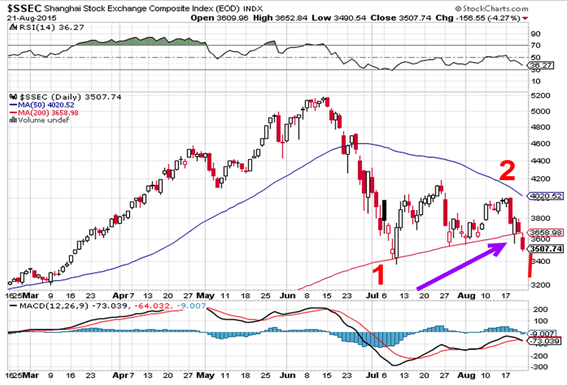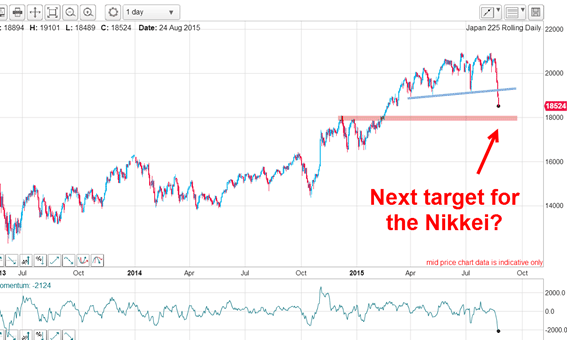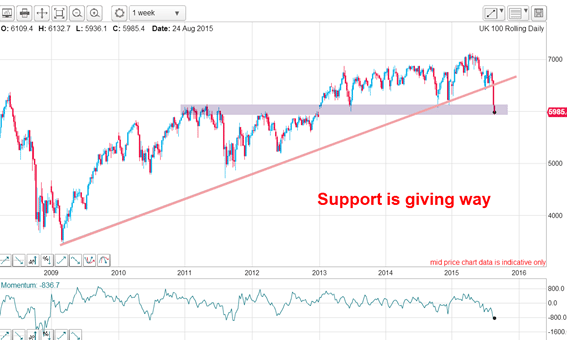Markets are a sham – investors are finding out the hard way
Investors have realised markets are all smoke and mirrors, says John C Burford. That's a very bearish sign.
Get the latest financial news, insights and expert analysis from our award-winning MoneyWeek team, to help you understand what really matters when it comes to your finances.
You are now subscribed
Your newsletter sign-up was successful
Want to add more newsletters?

Twice daily
MoneyWeek
Get the latest financial news, insights and expert analysis from our award-winning MoneyWeek team, to help you understand what really matters when it comes to your finances.

Four times a week
Look After My Bills
Sign up to our free money-saving newsletter, filled with the latest news and expert advice to help you find the best tips and deals for managing your bills. Start saving today!
In that classic scene from The Wizard of Oz, when Dorothy's little dog pulls back the curtain hiding the great and powerful wizard, he is revealed as a mere mortal, not the superhuman master of the Emerald City.
But instead of owning up to the scam, as soon as he's sighted by Dorothy and friends, he continues to pull the levers, turn the dials and keeps blowing smoke in a frantic attempt to keep the illusion going in his house of mirrors.
That very same process of denial is taking place right now as the monetary authorities and most financial advisers continue to assure us that everything is fine just keep on buying those alluring shares, the central bank wizards will perform their magic again! This story is playing out to packed (brokerage) houses in China but the picture painted by the Shanghai stock index is very bearish indeed. The critical 200-day moving averagehas now been breached and the market is in the early stages of a third wave down:
MoneyWeek
Subscribe to MoneyWeek today and get your first six magazine issues absolutely FREE

Sign up to Money Morning
Don't miss the latest investment and personal finances news, market analysis, plus money-saving tips with our free twice-daily newsletter
Don't miss the latest investment and personal finances news, market analysis, plus money-saving tips with our free twice-daily newsletter

This decline will be very dramatic as anger will turn on the authorities.
The curtain is being pulled away, and it's becoming clear that the central bank's power is all smoke and mirrors. And that same revelation is taking place in the US and the UK. The game is up and now the world's un-payable debt is bringing the whole house of cards down.
From now on, I expect headlines to emerge that are highly critical of central banks and their part in creating the myriad financial bubbles that are now popping. Take Japan, for example.
Japanese stocks have been much favoured in recent months, but major support has been breached and the market is in freefall as the yen strengthens in a flight to safety:

That wasn't supposed to happen!
Investors are in the first stage of grief: denial
But with the FTSE having lost almost 500 points (about 8%) just last week and another big loss this morning many are calling for calm heads. Here is just one typical article title from seekingalpha.com: "It's time to buy... not time to sell". Of course, it can be career-destroying advice for a financial adviser to recommend cashing out and leaving equities altogether. Very few will have the guts to do it.
My rule of thumb is this: do your own analysis even more in bear markets than in bull markets.
Since the lows of 2009, we have had several years of total complacency for ever-rising equities, centred on the belief that the central banks would continue to inject liquidity into the markets to contain all dips. But what many investors fail to realise is that there are limits to believing that making more money (and creating debt) available for equity purchases will forever promote bull markets.
It is a fallacy that making more money available must result in higher prices!
Let's just take apart the process of equity trading. When a share is bought, it must come from the seller and the funds used to buy it are just transferred from the buyer to the seller. The amount of money in the sale does not change. What is important is this: what does the seller, now flush with cash, do with the funds?
If they just sit on it, that reduces the buying pressure on the general market and would normally put downward pressure on the price level, if enough investors follow their lead. And if they decide to buy more shares and use more money to buy even more, then that will put upward pressure on the general price level.
In the first case, the investor has turned more cautious (more bearish), and in the second case, he has turned more confident (and more bullish). It's all about sentiment!
That process happens tens of thousands of time a day, and that is what moves the markets.
In the pandemonium of last week (and into today), the desire by many investors to sell some of their holdings and sit on the cash is overwhelming the desire of others to buy. That is why markets are falling hard. What you read about in the press is just a made-up story that rationalises what has just occurred. I read them purely for entertainment purposes.
The degree of ignorance in how markets really work is staggering but offers astute traders terrific opportunities!
The social mood is finally turning down along with stocks
For the first time in decades, there is serious talk of the Labour party splitting (the Corbyn effect), or even a brand new party starting up. But whatever happens, I expect major fragmentations in UK politics over the next few weeks, as will occur in the USA.
And one sure sign of a downturn in social mood is the division of the population into smaller and smaller groups. We already have four major UK political parties (previously three) and could be looking at a lot more soon.
What's more, the European Union is in danger of losing members with Grexit being widely discussed. The idea of an ever-closer union seems a dead duck now with immigration taking centre stage.
Is this just a dip in the FTSE?

The market has rapidly moved back into the upper grey support zone following the major trendline break. If that support could somehow hold, then it is possible the market can stage a rally back to the underside of the trend line to plant a kiss, where there resides powerful resistance.
It would take an almighty buying effort to break above that, but anything is possible in the markets (although not everything is probable).
But breaking below that grey support zone would put the Fibonacci 62% support area on the table as a probable target to the 5,000 area.
Get the latest financial news, insights and expert analysis from our award-winning MoneyWeek team, to help you understand what really matters when it comes to your finances.
John is is a British-born lapsed PhD physicist, who previously worked for Nasa on the Mars exploration team. He is a former commodity trading advisor with the US Commodities Futures Trading Commission, and worked in a boutique futures house in California in the 1980s.
He was a partner in one of the first futures newsletter advisory services, based in Washington DC, specialising in pork bellies and currencies. John is primarily a chart-reading trader, having cut his trading teeth in the days before PCs.
As well as his work in the financial world, he has launched, run and sold several 'real' businesses producing 'real' products.
-
 How a ‘great view’ from your home can boost its value by 35%
How a ‘great view’ from your home can boost its value by 35%A house that comes with a picturesque backdrop could add tens of thousands of pounds to its asking price – but how does each region compare?
-
 What is a care fees annuity and how much does it cost?
What is a care fees annuity and how much does it cost?How we will be cared for in our later years – and how much we are willing to pay for it – are conversations best had as early as possible. One option to cover the cost is a care fees annuity. We look at the pros and cons.